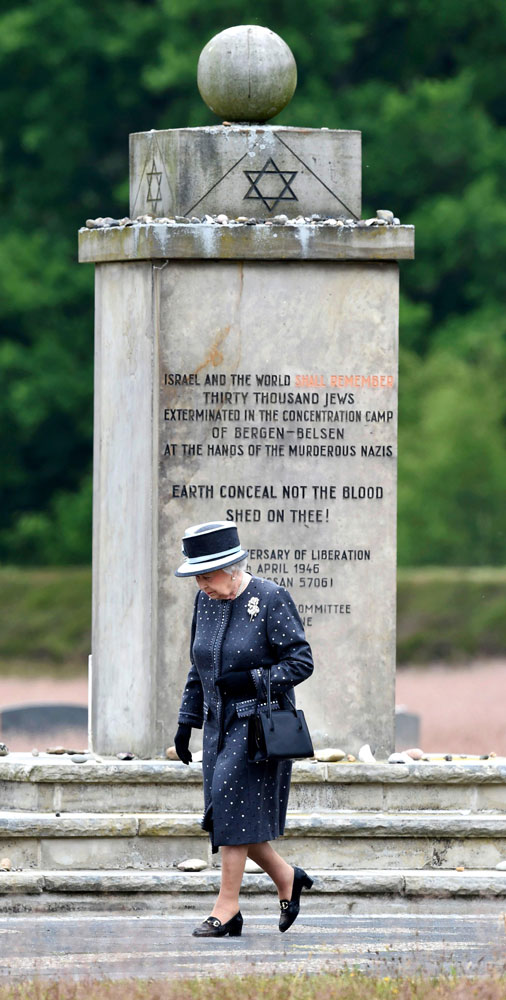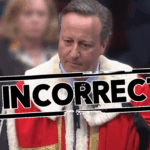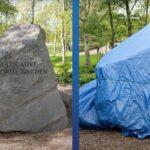This article first appeared in the CUFI UK Torch Magazine. For the latest issue, see here.
Queen Elizabeth II will always be remembered for her committed servant-heart, her Christian example and her godly wisdom among other wonderful traits for which she is held dear. We take a look at how important the Queen regarded Holocaust remembrance and some of her experiences with the Jewish community that remind us how blessed we are to have lived during her long reign.
“I’ll tell my sister”
In 1990, Her Majesty The Queen’s late sister, Princess Margaret, visited Maidenhead synagogue. She was attending a service marking the synagogue’s 50th anniversary and was struck by the fact that the Rabbi read a prayer for the good health and wise counsel of The Queen.
When it was explained to her that the prayer was not a one-off but is recited every Sabbath, in every synagogue in Britain, she remarked, “How lovely, they don’t do that for us in church; I’ll tell my sister.”
We’re sure the Queen, a devout Christian, appreciated the prayers of the Jewish community. In a tribute following her death, Chief Rabbi Mirvis gave another insight into how Jews respected the Queen, writing, “in the blessing that we make upon seeing a Monarch, we declare, ‘Blessed are You Hashem… who has given of His honour to flesh and blood.’”
“The King of Kings certainly gave of His honour to Her Majesty The Queen,” he continued, “and she in turn related to every single person with honour, warmth and dignity. As we mourn her loss, her legacy to the world is more evident than it has ever been – that there can be no greater honour on earth than the service of others.”
“Moved to tears”
It was this same humble service that the late Rabbi Lord Sacks inferred, recalling one touching occasion that almost moved him to tears when the Queen met a group of Holocaust survivors.
He wrote: “Punctuality, said Louis XVIII of France, is the politeness of kings. Royalty arrives on time and leaves on time. So it is with Her Majesty The Queen, with one memorable exception.”
“The day was 27 January 2005, the sixtieth anniversary of the liberation of Auschwitz, and the place, St James’ Palace. The Queen was meeting a group of Holocaust survivors. When the time came for her to leave, she stayed. And stayed. One of her attendants said he had never known her to linger so long after her scheduled departure time. She gave each survivor – it was a large group – her focussed, unhurried attention. She stood with each until they had finished telling their personal story.”
“It was an act of kindness that almost had me in tears… It brought a kind of blessed closure into deeply lacerated lives.”
Karen Pollack, Chief Executive of Holocaust Educational Trust, also recalled the occasion in an op-ed for the Jewish Chronicle, writing, “Survivors still talk about that day. Never had they imagined, after being incarcerated in camps, starving and emaciated, a future where they would stand alongside Her Majesty The Queen. I will always remember the genuine interest and attention she gave to every single survivor there, listening to each unique personal story.”
She continues, “The late Paul Oppenheimer quipped: ‘From Belsen to Buckingham Palace, it’s quite a journey.’”
In 2000, the Queen inaugurated Britain’s first permanent memorial to the Holocaust. The Queen was patron of the Council of Christians and Jews and also the UK Holocaust Memorial Day Trust from its establishment in 2005 until she passed it on to Prince Charles, now King Charles, in 2015.
Visit to Bergen-Belsen
In 2015, the Queen and Prince Phillip visited Bergen-Belsen concentration camp. The Queen had never been to a former concentration camp and it is said that she personally requested this visit. After taking in the site, she met with Jewish survivors of the camp as well as some of their British liberators and was deeply moved by the whole experience.
Chief Rabbi Ephraim Mirvis accompanied her visit and said, “I told the Queen that the Jewish world appreciates enormously her gesture in coming here, because it shows her solidarity with our pain and suffering.”
Karen Pollock attributes many people hearing about Bergen-Belsen for the first time to the Queen’s visit in 2015: “She stood alongside the Duke of Edinburgh at Bergen-Belsen, 70 years after its liberation. She met Holocaust survivors including Rudi Oppenheimer and Anita Lasker-Wallfisch and veterans Bernard Levy and Captain Eric ‘Winkle’ Brown who liberated the camp. On that day, she reminded the world of the horrors of the past, and sent a warning about the dangers of hatred and antisemitism and where it can lead. Thanks to Her Majesty, millions of people were reminded of, or perhaps heard for the first time, the name Bergen-Belsen.”
The “great British dream”
As part of her 90th birthday celebrations, the Queen hosted Rabbi Mirvis and his wife at Windsor, who stayed the night at the Royal residence followed by a special dinner with Her Majesty and Prince Phillip. During his stay, the Chief Rabbi presented Her Majesty with a birthday gift of a hand crafted piece of art, designed by British artist Myra Levy, which featured a unique ‘paper cut’ border around a specially calligraphed version of the prayer that the Jewish people say for the Royal Family in synagogues each week.
Chief Rabbi Mirvis also penned the following letter to accompany the gift: “When the country has celebrated moments of the greatest national joy and when we have struggled together in times of the greatest desolation, you have been generous in your wisdom and unwavering in your fortitude. Since Jews resettled in Great Britain some 360 years ago, we have relentlessly pursued the great British dream, to prosper in a society which sees the humanity in all people and feels a sharp sense of responsibility to one and all. Your Majesty, you are the very embodiment of these values.”

It’s these values that we pray will be continued by her son, King Charles III and his heir, the Prince of Wales. This legacy has already been evidenced by His Majesty the King and Queen Consort meeting Holocaust survivors on several occasions and speaking out passionately about the importance of remembering the lessons of the Holocaust. Prince William and Princess Catherine have also shown that they share the Queen’s compassion for Jewish survivors, demonstrated by their memorable participation in the 2020 Holocaust Memorial Day, for the 75th anniversary of the liberation of Auschwitz, and also Prince William’s meeting survivors during the first official Royal visit to Israel, where the heir to the throne also visited and lay a wreath at Yad Vashem.
“Each time a member of the Royal Family meets a survivor, visits a Holocaust site, and uses their voices to raise awareness – they encourage people the length and breadth of the country, and beyond, to remember and reflect on the past,” Karen Pollack adds. “The role that they have played and will continue to play – inspired and led by Her Majesty The Queen – cannot be underestimated, and has helped shape how the Holocaust will be remembered for generations to come.”










